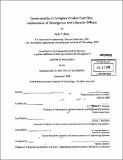Commonality in complex product families : implications of divergence and lifecycle offsets
Author(s)
Boas, Ryan C
DownloadFull printable version (48.59Mb)
Other Contributors
Massachusetts Institute of Technology. Engineering Systems Division.
Advisor
Edward F. Crawley.
Terms of use
Metadata
Show full item recordAbstract
Commonality, or the sharing of components, processes, technologies, interfaces and/or infrastructure across a product family, represents one of many potential tools for increasing corporate profitability. Industrial interest in commonality is strong, but results appear to be mixed. A rich stream of academic research has examined commonality (typically under terms such as "product platforms" and "platform-based development") but has not emphasized the benefits and penalties of commonality, a topic that is critical to effective product family planning and lifecycle management, and ultimately, to improving corporate profitability. This dissertation leverages field research and a simple cost model to examine commonality in the context of complex product families. The core research effort was focused on conducting seven case studies of complex product families (aircraft, automobiles, satellites, and capital equipment). While the case studies provided a wealth of general insights, the studies were focused on examining divergence and lifecycle offsets, two critical topics that influence the benefits and penalties of commonality, yet appear to be inadequately addressed by the literature. Divergence refers to the tendency for commonality to reduce with time, for both beneficial and non-beneficial reasons. Lifecycle offsets refer to temporal differences between the lifecycle phases of product family members. Lifecycle offsets alter the potential benefits and penalties of commonality and their apportionment to individual products. (cont.) Additionally, key factors identified during the literature review and case studies were translated into a simple two-product cost model of development and production in order to demonstrate key research insights in a more analytical manner. The case studies provide a refined view of commonality that reflects the realities of industrial practice. The cases indicate that complex product families are developed in a mostly sequential manner; that commonality is highest during the product family planning phase and then declines significantly throughout the lifecycle; and that development focuses more on reusing prior product baselines than on enabling future, potential commonality. The case studies also identified challenges in the evaluation of commonality and its lifecycle management. The case findings and simple cost model contribute to an improved understanding of commonality, while the recommendations offer potential paths to improved corporate profitability.
Description
Thesis (Ph. D.)--Massachusetts Institute of Technology, Engineering Systems Division, 2008. Cataloged from PDF version of thesis. Includes bibliographical references (p. 220-224).
Date issued
2008Department
Massachusetts Institute of Technology. Engineering Systems DivisionPublisher
Massachusetts Institute of Technology
Keywords
Engineering Systems Division.